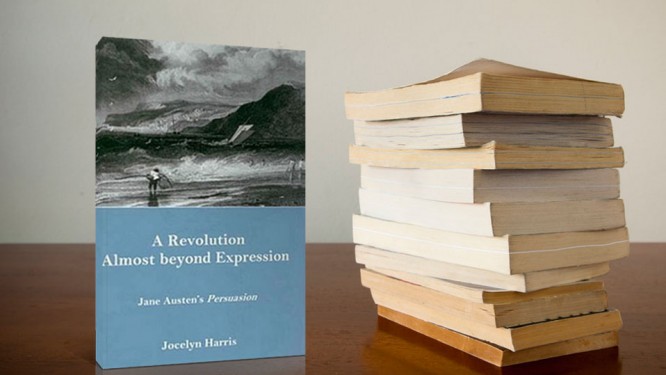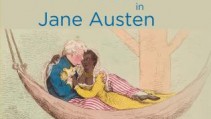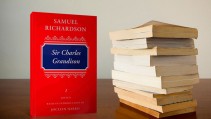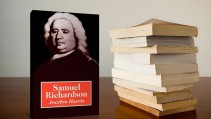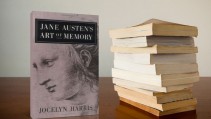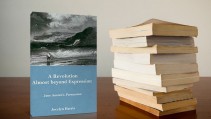-

Jocelyn Harris & Dr. Lisa Marr
-
A Revolution Almost Beyond Expression: Jane Austen’s “Persuasion.” Delaware University Press, 2007. Repr. Rowman & Littlefield, 2013.
Order
Buy Online: Jane Austen Books.
Buy Online: Rowman and Littlefield Publishers.
Reviews
Harris’ 2007 book A Revolution Almost Beyond Expression: Jane Austen’s Persuasion – this month’s entry in my Austen Catch-Up Project, wherein I spend 2016 closing some of the gaps in my Janeite education — seeks to challenge this myth by showing that Austen’s novels are more than the circumscribed, domestic tales they are sometimes taken to be. A close look at Persuasion demonstrates that Austen is a careful, conscious artist wholly engaged with the political, historical and literary currents of her day, Harris asserts.
I’m no scholar, but I do wonder if this case still needs making. Yes, Henry James condescendingly compared Austen to “the brown thrush who tells his story from the garden bough,” as if Austen’s work were the product of nothing but nature and instinct – but that was in 1905. Surely by now everyone who has spent any time thinking about Austen knows that she is, as Harris puts it, “an outward-looking, aware, and fully professional author.”
Be that as it may, Harris’ book is an often fascinating look at the elements of Austen’s life, Austen’s world and Austen’s reading to which she was responding in her final completed novel. Harris finds Austen echoing Byron, critiquing Scott, and formulating important tenets of the Romantic movement. Her Austen reflects national angst over the power and charisma of Napoleon Bonaparte; reimagines the heroic, flawed Lord Nelson in Captain Wentworth; and interrogates gender norms by creating a powerfully self-aware heroine and a hero at the mercy of his emotions.
Too often, Harris suggests, critics have defaulted to biographical explanations for elements of Austen’s work – finding in Persuasion’s autumnal mood a reflection of Austen’s encroaching fatal illness, for example – without looking more carefully at alternatives that would show her to be more politically engaged. “The nation’s jubilee after the prolonged carnage of the Napoleonic Wars offers a more likely inspiration for the novel’s mixed mood of loss and celebration, its intensity of pain and pleasure,” Harris writes. And she argues convincingly that this tendency to privilege the biographical reflects a sexist assumption that women can write only out of personal experience.
Along the way, Harris offers interesting and useful context – for instance, sketching in the history and social profile of Bath and Lyme in ways that highlight the contrast Austen intended to draw between the oppression of the city and the freedom of the seaside resort.
As a writer myself, I was especially taken by Harris’ close analysis of Austen’s work on the famous “canceled chapters” of Persuasion, her original (and far inferior) draft of the book’s ending. (Eventually, of course, Austen entirely omitted important parts of even the revised version, replacing it with the sublime published ending, where Anne’s conversation with Captain Harville about the relative constancy of men and women, and Captain Wentworth’s swoon-worthy letter, appear for the first time.) Nothing about Austen’s careful revisions, the alteration of a word here and a phrase there, is particularly remarkable: it’s what writers do. But it’s fascinating to see the genius at work, sketching in her characters’ reactions and then going back to question, and improve upon, her first thought.
Endlessly fascinating, peeling back layer after layer of meaning and context to reveal the very bones of Jane Austen’s most elegaic work. … reveals so much about the process of writing and the influences at work on the writer’s consciousness … Harris goes on to discuss just how contemporary and “aware” Austen was during the writing and rewriting of “Persuasion” … illuminating chapter on Austen’s attitude to Sir Walter Scott …. for those who love “Persuasion,” with its ultimate themes of hope and redemption, it’s a superb and enlightening companion … Exceptionally illuminating study of “Persuasion” by leading Jane Austen scholar (Regency World, May 2014).
Confirmed Austenistas … will rightly consider it worth their while to read everything that Harris writes about Austen, and their reward will be a fund of subsidiary claims so rich that it hardly matters what larger purpose these claims serve. … Harris’s own classic study, Jane Austen’s Art of Memory … Such readers will prize this book for so often hoisting Austen out of spheres (such as the linguistic) easily dismissible as feminine and setting her off instead against a backdrop of military history.
Pride of place goes nonetheless to literary and biographical fare. … There follow two sensitive, illuminating, meticulous chapters comparing the surviving manuscripts of Austen’s drafts of Persuasion with the revised version. … the most thorough and satisfying discussion of the cancelled chapters I have seen … excitingly … engaging detail.
The previously published chapter ‘Domestic Virtues and National Importance’ is the center of the book and one of its striking achievements … patient expertise in naval history… fascinating information …. Such quick shifts are characteristic of Harris at her best. … refreshing … stimulating … deftly supported idea …
These beautiful, affecting essays about Lyme, Bath, and their roles in Persuasion combine the artfulness of good travel writing with a wealth of suggestive historical detail. … all serve in Harris’s hands to illuminate Persuasion. … Harris shows authoritatively … best of all is the pleasure of being guided by Harris through the streets of Baths as she examines the social implications …
A lovely Conclusion … this volume will become for many readers an invaluable reference … thrilling facts … She has a wonderful ear for Austen, she has memorized the novels, she picks up allusions or possible allusions in brief phrases, and she gives us the benefit of this ability. Grateful scholars will be piecing together the riches she has heaped up here — brief references to Antony and Othello spring most immediately to mind — for years to come.
This is a book about writing as process, and about the matter of literary originality, as much as it is an exceptionally rewarding reading of a Jane Austen novel … two outstanding chapters … lively social history … fascinating and telling account … a characteristically clear and cogent passage … In a pleasing symmetry, Austen’s novel, so concerned with female authority, and written at the peak of her own powers, has received a critical treatment that is itself a confident distillation of learning and experience. Few readers will agree with everything that Harris has to say, but it is difficult to imagine any reader who will not learn from this vigorous and enjoyable book.
Exemplifies the luminous clarity of her prose … sympathetic and plausible reading … gems of interpretive discovery … Harris’s study of Persuasion as a politically and culturally informed Romantic novel [confirms] that Austen’s works can only be fully appreciated with a restored understanding of the times in which they were written.
Underscores once again Jocelyn Harris’s eye for reading literature in terms of its larger context, for making important connections, and for noticing and explicating in Jane Austen’s work [her] transformations of the work of other authors … A Revolution Almost beyond Expression makes for interesting and compelling reading — a welcome companion to Jane Austen’s Persuasion.
Jocelyn Harris’s extended defence of Persuasion as an ‘innovative, even revolutionary’ novel is … much to be welcomed … the relationship between Persuasion and numerous surrounding texts [is] revealed gradually and astonishingly … the literary revolution presented in this book will be a revelation … any serious discussion of Persuasion will now have to engage with Jocelyn Harris’s book.
A Revolution Almost Beyond Expression brings new contextual and historical considerations to light, and examines some already well-known. It opens up further possibilities for research and critical re-evaluation, and shows how much can be done by critical and well-researched delving into associated texts and historical records … interesting … intriguing.
Building (some may say improving) on scholarship by Peter Knox-Shaw (Jane Austen and the Enlightenment) … and Brian Southam (Jane Austen and the Navy), Harris … argues that Austen was a Romantic who consciously reacted to the political and military turmoil of her day. … Harris’s historical take, encouraging close readings of texts rather than beginning with assumptions about Austen, is both critical and timely. More impressive is Harris’s deft reconstruction of how Austen wrote: by examining surviving manuscripts, she traces Austen’s revisions of Persuasion from the first draft to the final version. A valuable study for all those who are interested in Austen, this volume joins such important introductions to the writer as [work by] Edward Copeland and Juliet McMaster … and … Claudia Johnson … Highly recommended. Upper-division undergraduates through faculty.
In her fascinating new study … rich … radical … Harris mounts … a defence of Persuasion to reveal an unprecedented literary achievement and an astonishing level of rather sly interaction with early nineteenth-century cultural politics … shares critical affinities with the work of Claudia L. Johnson and Peter Knox-Shaw … fruitful speculation about Austen’s drafting and revision practices … compelling arguments … Harris challenges us … to reconsider the so-called ‘failings’ of Persuasion, and to read all of Austen’s novels with constant vigilance, and an open mind.
There has been only one significant single treatment of [Austen’s] work this year: Jocelyn Harris’s A Revolution Almost beyond Expression: Jane Austen’s ‘Persuasion’ … thorough and often fascinating … One finishes this study with a much better understanding of the novel’s literary origins, of its allusions to the Napoleonic wars and to the British navy, of the settings, and even of Austen’s revisions.
Jocelyn Harris … invites us to contemplate … a novelist who writes with political awareness and extensive knowledge … By scrupulously examining the sequence of revisions, she demonstrates how carefully Austen worked and how brilliantly she focussed her points … The critic makes the most of the rare opportunity Austen’s cancelled chapters provide for tracing the novelist’s creative processes … great resonance … compelling … convincing detail … Revealing … A work of commanding erudition, informed by intimate knowledge of Austen and of her literary, social, and political contexts … [Harris’s] far-ranging knowledge and her verbal energy … have generated an impressive critical work.
A pleasure to read a sustained, multilayered study of a single novel, especially a novel as rich and beloved as Persuasion … meticulous study of ‘the contexts and intertexts’ of Persuasion … Harris’s prose is clear and engaging. The book will be invaluable to anyone embarking on a study of Persuasion and has much to offer other readers as well. … illuminating commentary … Equally strong are the discussions of Lyme Regis and Bath … clever premise … vivid and detailed … convincing case … Harris’s methodology is provocative … valuable [contribution] to the distinguished body of Austen scholarship.
… fascinating … argues convincingly that this tendency to privilege the biographical reflects a sexist assumption that women can write only out of personal experience … As a writer myself, I was especially taken by Harris’ close analysis of Austen’s work on the famous ‘cancelled chapters’ of Persuasion … it’s fascinating to see the genius at work.

